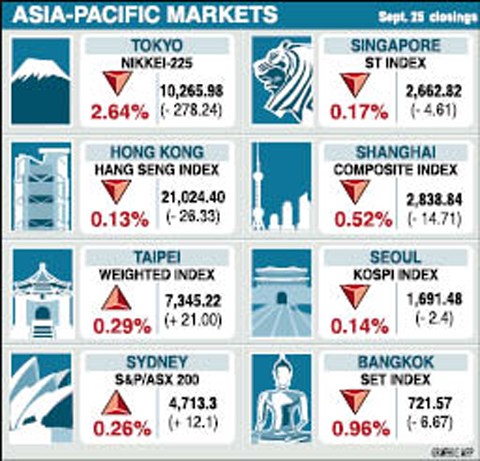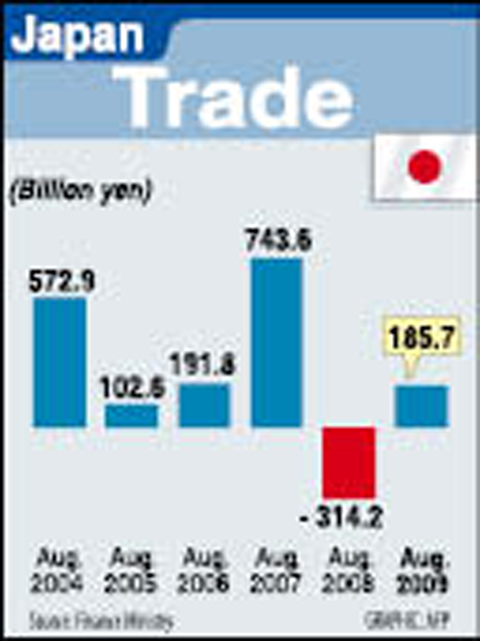Asian stocks declined for the first time in three weeks as commodities prices slumped and companies took advantage of the recent rally to sell new shares.
Aluminum Corp of China (中國鋁業), China’s biggest producer of the metal, slumped 8 percent in Hong Kong. BHP Billiton Ltd, the world’s largest miner, fell 3 percent. Nomura Holdings Inc, Japan’s biggest brokerage, slumped 17 percent after announcing a record US$5.6 billion share sale. Guoyuan Securities Co (國元證券) slumped 11 percent after regulators approved its plan to sell additional equity.
“I wouldn’t be surprised if we’d seen the peak of the market for this year because the economic news isn’t going to improve very much,” investor Marc Faber, the publisher of the Gloom, Boom & Doom report, said in an interview with Bloomberg Television on Friday. “The correction in the market has been overdue for quite some time.”

The MSCI Asia-Pacific Index dropped 0.5 percent this week to 117.77. Asian markets have rallied 67 percent since the MSCI benchmark dropped to a five-year low on March 9.
Japan’s Nikkei 225 Stock Average fell 1 percent, while China’s benchmark Shanghai Composite Index tumbled 4.2 percent for the region’s steepest decline. Vietnam, Thailand and Indonesia were among markets that posted gains this week.
Taiwanese share prices are expected to see buying from local institutional investors in an attempt to dress up their books with the quarter coming to an end next week, dealers said on Friday.

However, the upside room is limited as the market moves closer to a strong resistance level at around 7,500 points, they said.
For the week to Friday, the weighted index fell 181.33 points, or 2.41 percent, to 7,345.22, after a 2.58 percent increase a week earlier.
Average daily turnover stood at NT$109.74 billion (US$3.39 billion), compared with NT$116.70 billion the previous week.
“I do not have high hopes about local institutional buying as the interest is expected to focus on small and mid-cap stocks on low valuations instead of large-sized counterparts,” Grand Cathay Securities Corp (大華證券) analyst Mars Hsu said.
Other markets on Friday:
HONG KONG: Down 0.13 percent. The Hang Seng Index lost 26.33 points at 21,024.40.
“Concerns the US Federal Reserve will scale back some of its supportive measures for the economy will weigh on the local market in the near term,” Ernie Hon, strategist at ICBC International Securities told Dow Jones Newswires.
SHANGHAI: Down 0.52 percent. The Shanghai Composite Index, which covers both A and B shares, was down 14.71 points to 2,838.84.
“The fall in large-caps and sharply shrinking turnover shows investors’ sentiment remains very weak and the market has no momentum to go upward in the near term,” said Zhou Lin, an analyst at Huatai Securities.
SEOUL: Down 0.14 percent. The KOSPI lost 2.4 points to close at 1,691.48.
SINGAPORE: Down 0.17 percent. The Straits Times Index fell 4.61 points to 2,662.82.
BANGKOK: Down 0.96 percent. The Stock Exchange of Thailand fell 6.97 points to close at 721.57.
KUALA LUMPUR: Flat. The Kuala Lumpur Composite Index lost 0.67 points to close at 1,217.39
JAKARTA: Down 0.98 percent. The Jakarta Composite Index lost 24.32 points to 2,444.58.
MANILA: Down 0.56 percent. The composite index fell 16.00 points to 2,821.34.
“The US markets are down and its probably also a reaction to the import figures,” for July, Paul Balaoing of PCCI Securities Brokers said.
“Everyone was expecting that by this time, import figures would have improved,” he said.
MUMBAI: Down 0.53 percent. The 30-share SENSEX index fell 88.43 points to 16,693.

Rainfall is expected to become more widespread and persistent across central and southern Taiwan over the next few days, with the effects of the weather patterns becoming most prominent between last night and tomorrow, the Central Weather Administration (CWA) said yesterday. Independent meteorologist Daniel Wu (吳德榮) said that based on the latest forecast models of the combination of a low-pressure system and southwesterly winds, rainfall and flooding are expected to continue in central and southern Taiwan from today to Sunday. The CWA also warned of flash floods, thunder and lightning, and strong gusts in these areas, as well as landslides and fallen

WAITING GAME: The US has so far only offered a ‘best rate tariff,’ which officials assume is about 15 percent, the same as Japan, a person familiar with the matter said Taiwan and the US have completed “technical consultations” regarding tariffs and a finalized rate is expected to be released soon, Executive Yuan spokeswoman Michelle Lee (李慧芝) told a news conference yesterday, as a 90-day pause on US President Donald Trump’s “reciprocal” tariffs is set to expire today. The two countries have reached a “certain degree of consensus” on issues such as tariffs, nontariff trade barriers, trade facilitation, supply chain resilience and economic security, Lee said. They also discussed opportunities for cooperation, investment and procurement, she said. A joint statement is still being negotiated and would be released once the US government has made

SOUTH CHINA SEA? The Philippine president spoke of adding more classrooms and power plants, while skipping tensions with China over disputed areas Philippine President Ferdinand Marcos Jr yesterday blasted “useless and crumbling” flood control projects in a state of the nation address that focused on domestic issues after a months-long feud with his vice president. Addressing a joint session of congress after days of rain that left at least 31 dead, Marcos repeated his recent warning that the nation faced a climate change-driven “new normal,” while pledging to investigate publicly funded projects that had failed. “Let’s not pretend, the people know that these projects can breed corruption. Kickbacks ... for the boys,” he said, citing houses that were “swept away” by the floods. “Someone has

‘CRUDE’: The potential countermeasure is in response to South Africa renaming Taiwan’s representative offices and the insistence that it move out of Pretoria Taiwan is considering banning exports of semiconductors to South Africa after the latter unilaterally downgraded and changed the names of Taiwan’s two representative offices, the Ministry of Foreign Affairs (MOFA) said yesterday. On Monday last week, the South African Department of International Relations and Cooperation unilaterally released a statement saying that, as of April 1, the Taipei Liaison Offices in Pretoria and Cape Town had been renamed the “Taipei Commercial Office in Johannesburg” and the “Taipei Commercial Office in Cape Town.” Citing UN General Assembly Resolution 2758, it said that South Africa “recognizes the People’s Republic of China (PRC) as the sole